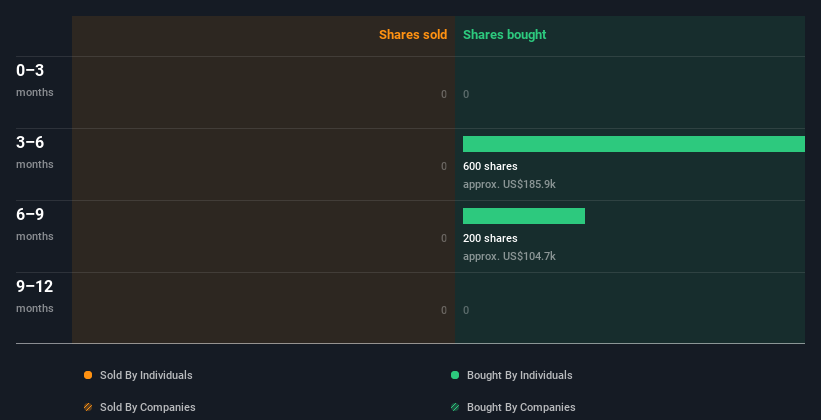Favourable Signals For Atrion: Numerous Insiders Acquired Stock
Usually, when one insider buys stock, it might not be a monumental event. But when multiple insiders are buying like they did in the case of Atrion Corporation (NASDAQ:ATRI), that sends out a positive message to the company's shareholders.
While we would never suggest that investors should base their decisions solely on what the directors of a company have been doing, we do think it is perfectly logical to keep tabs on what insiders are doing.
View our latest analysis for Atrion
Atrion Insider Transactions Over The Last Year
In the last twelve months, the biggest single purchase by an insider was when Independent Director Preston Athey bought US$105k worth of shares at a price of US$523 per share. So it's clear an insider wanted to buy, even at a higher price than the current share price (being US$399). It's very possible they regret the purchase, but it's more likely they are bullish about the company. In our view, the price an insider pays for shares is very important. Generally speaking, it catches our eye when insiders have purchased shares at above current prices, as it suggests they believed the shares were worth buying, even at a higher price.
While Atrion insiders bought shares during the last year, they didn't sell. They paid about US$363 on average. It's great to see insiders putting their own cash into the company's stock, albeit at below the recent share price. You can see a visual depiction of insider transactions (by companies and individuals) over the last 12 months, below. If you want to know exactly who sold, for how much, and when, simply click on the graph below!
There are plenty of other companies that have insiders buying up shares. You probably do not want to miss this free list of growing companies that insiders are buying.
Insider Ownership
Many investors like to check how much of a company is owned by insiders. I reckon it's a good sign if insiders own a significant number of shares in the company. Atrion insiders own 16% of the company, currently worth about US$116m based on the recent share price. I like to see this level of insider ownership, because it increases the chances that management are thinking about the best interests of shareholders.
So What Does This Data Suggest About Atrion Insiders?
There haven't been any insider transactions in the last three months -- that doesn't mean much. However, our analysis of transactions over the last year is heartening. It would be great to see more insider buying, but overall it seems like Atrion insiders are reasonably well aligned (owning significant chunk of the company's shares) and optimistic for the future. So while it's helpful to know what insiders are doing in terms of buying or selling, it's also helpful to know the risks that a particular company is facing. For example, Atrion has 3 warning signs (and 1 which is significant) we think you should know about.
But note: Atrion may not be the best stock to buy. So take a peek at this free list of interesting companies with high ROE and low debt.
For the purposes of this article, insiders are those individuals who report their transactions to the relevant regulatory body. We currently account for open market transactions and private dispositions of direct interests only, but not derivative transactions or indirect interests.
Have feedback on this article? Concerned about the content? Get in touch with us directly. Alternatively, email editorial-team (at) simplywallst.com.
This article by Simply Wall St is general in nature. We provide commentary based on historical data and analyst forecasts only using an unbiased methodology and our articles are not intended to be financial advice. It does not constitute a recommendation to buy or sell any stock, and does not take account of your objectives, or your financial situation. We aim to bring you long-term focused analysis driven by fundamental data. Note that our analysis may not factor in the latest price-sensitive company announcements or qualitative material. Simply Wall St has no position in any stocks mentioned.

 Yahoo Finance
Yahoo Finance 
